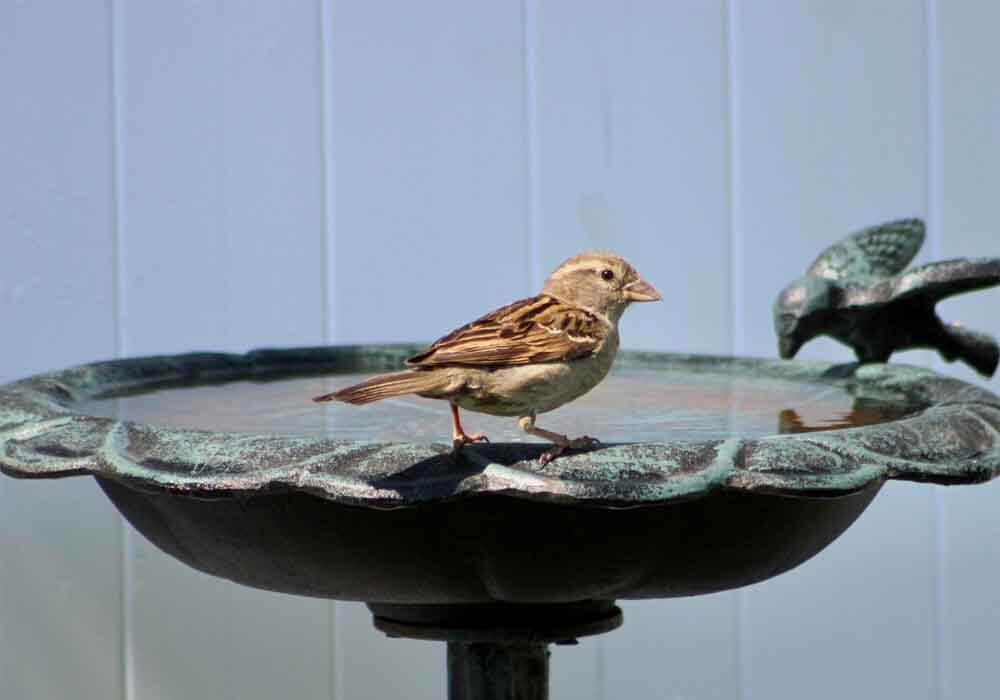Are Bird Baths Good or Bad
for Birds?
Nothing beats waking up to the melodic chirping of birds vacationing in your bird bath. However, considering the risks associated with stagnant water, are bird baths good or bad for birds?
Bird baths are good for birds because they fulfill hydration and hygienic needs. However, birds can become sick if the water in a bird bath is contaminated. The best practice for using bird baths is to keep them clean, supply them with running water, and choose an optimal location.
Birds love bird baths as long as they’re clean. Read on to learn more about bird baths, their pros and cons, and how to maintain your bird bath. Let’s dive right in!

Pros and Cons of Bird Baths
Now that I’ve discussed the main functions of a bird bath, let’s take a look at the benefits and drawbacks:
Pros of Bird Baths
Bird baths offer various benefits for birds:
They can attract more birds to your backyard. While this benefit doesn’t affect birds themselves, it is a selfish one because having a water source in your backyard can attract some interesting bird species. Once they become used to having a bird bath in your yard, you can expect more birds to use it.
- They provide a source of hydration in busy urban areas: Birds, like all animals, require adequate hydration to survive. In urban landscapes, these water sources aren’t as easily available or desirable. Bird baths provide readily available water all year round.
- They allow birds to bathe: Birds need to preen to keep up hygiene and remove parasites. Because they can unload debris and parasites during bathing, bird baths can become contaminated if not regularly cleaned.
- They help birds regulate their temperature: Birds are highly active and need a way to cool off in the summer. A pool of water is one of the best ways to accomplish this task.
Cons of Bird Baths
Having a bird bath in your garden is generally a good thing to do. However, it can be bad for birds if you don’t maintain it properly, and it becomes contaminated.
Bird baths are semi-stagnant water sources that can quickly become contaminated. Water sources are great for any animal, but stagnant or semi-stagnant water sources don’t have a reliable mechanism to filter out harmful microorganisms or minerals in the water.
Most natural water sources, such as rivers, ponds, and lakes, have a carefully maintained ecosystem that filters and protects water. Bird baths and other constructs rely on external methods to filter the water.
If a bird bath is not cleaned regularly, it can become a breeding ground for parasites that threaten birds who drink or bathe there.

Are birdbaths mainly ornamental, functional, or do they have other purposes? We dig further into this fascinating topic of what are birdbaths used for in this article of ours.
How to Maintain Your Bird Bath
Bird baths are good for birds if the baths are correctly maintained and supplied with fresh water.
Additionally, bird baths are much more appealing to birds when they:
- Have a stable temperature
- The water is moving
- There are some decorations to attract birds
Feeders can also complement baths to give birds everything they need. However, the same disadvantages apply to bird feeders. Any location where birds congregate that isn’t regularly cleaned can be a breeding ground for potential parasites or diseases.
Below are the best practices for homeowners who want to maintain their bird baths to provide the best accommodation for birds who visit daily:
Choose an Optimal Location for Your Bird Bath
If you’re considering getting a bird bath, the first step is finding a suitable location. The best spots are optimal for birds and give you a great view of the bath.
The most optimal locations for bird baths are shaded areas surrounded by shrubs or trees. Shaded areas provide the following advantages:
- They give the birds a sense of shelter.
- They keep the bath away from predators.
- They keep the water cooler.
- They decrease the rate of evaporation.
- They decrease the growth rate of algae and parasites.
Keep the Bird Bath Clean
The best thing you can do to optimize your bird bath is to regularly clean it to remove any harmful parasites or microorganisms.
Cleaning your bird bath or feeder at least 1-2 times a month is the best practice. However, weekly cleanings will offer the best chances of sterilization. You can use a standard disinfectant, provided that you thoroughly rinse it out of the bird bath when finished.
Additionally, aim to change the water at least twice a week and up to once a day if possible. When changing the water, clean out any debris in the bird bath. Also, don’t hesitate to scrub it away if you notice any grime buildup or algae on the bird bath.
Keep the Bath Supplied With Fresh Water
Fresh water is a beautiful sight and provides the safest hydration source for birds. Additionally, new water aids hygienic needs by keeping birds clean after they bathe.
The most significant threat to birds using bird baths are bacteria and parasites that build up in the water as multiple birds bathe there. While a few microorganisms are normal and good for the immune system, the growth of harmful bacteria is potentially threatening to birds.
Keeping your bird bath clean and resupplying it with fresh water is the best way to ensure birds have safe and pleasant visits to your bird bath.
You can maximize the freshness of your water by implementing running water and maintaining a stable temperature.
The following two tips are optional and increase the quality of birds’ experience with your bird bath.
Use Running Water With a Stable Temperature
The only thing better than fresh water is running water. Running water is highly appealing to birds because it maintains the quality of the water and mimics the experience of a natural watering source.
One option is to fit a pump or fountain that regularly filters water through the birdbath. Using a fountain system will be the most visually appealing. However, there may be more cost-effective options available.
Other solutions are to use drippers to slowly replenish water, misters, or anything that can provide a slight motion to the water. Having waves, ripples, or drips give the birdbath aesthetic appeal while making the experience more enjoyable for birds.
In addition, maintaining a stable temperature ensures that birds are comfortable and can depend on your birdbath when they need it most. Aim to keep a moderate temperature year-round, keeping the water cool in the summer and tepid in the winter.
Don’t Be Afraid To Add Decorations
Birds are visual animals and are not afraid to get fancy while they take a bath. Decorations add color, texture, and personality to a bird bath, offering a better experience for homeowners and birds alike.
The best decorations mimic natural watering sources birds would usually bathe at. I recommend rocks or pebbles and some light plastic shrubbery to give the bath a more outdoorsy feel.
Appropriately positioned pebbles can also help:
- Set the depth of your birdbath if it’s too deep.
- Give perching spots for birds.
- Provide a rough surface for birds to grab onto if the bath becomes slippery. are bird baths good or bad for birds
More Helpful Related Articles

- Top Moving Water Birdbaths: Water that's moving keeps it fresh, and birds love fresh.
- Birdbaths That Birds Will Use: Surprisingly, birds are fussy bathers, here's ones that attract them most.
- Best Low-Cost Birdbaths: These
baths may be low cost, but the birds won't care when they're dirty.
Are Bird Baths Good Or Bad For Birds?...
Conclusion
Birds are masters of the air, and it’s delightful when they humble themselves enough to visit our backyard birdbaths. Birdbaths are safe and helpful to birds, provided they are properly maintained.
In urban or suburban environments, birds rely on birdbaths for essential hydration and hygienic needs. However, unclean bird baths can be potentially harmful to visiting birds.
The best practice to maintain your bird bath is cleaning it regularly and supplying it with fresh water.
Back To The TOP Of This Are Bird
Baths Good Or Bad For Birds Page

About the Author...
Richard Worden, a dedicated bird lover for over 20 years, I love to share my in-depth knowledge and passion for birds. Read more About Me and my expertise in this field.
- We Know Birds HOME ›
- Bird Facts and Information ›
- Are Bird Baths Good Or Bad For Birds?



